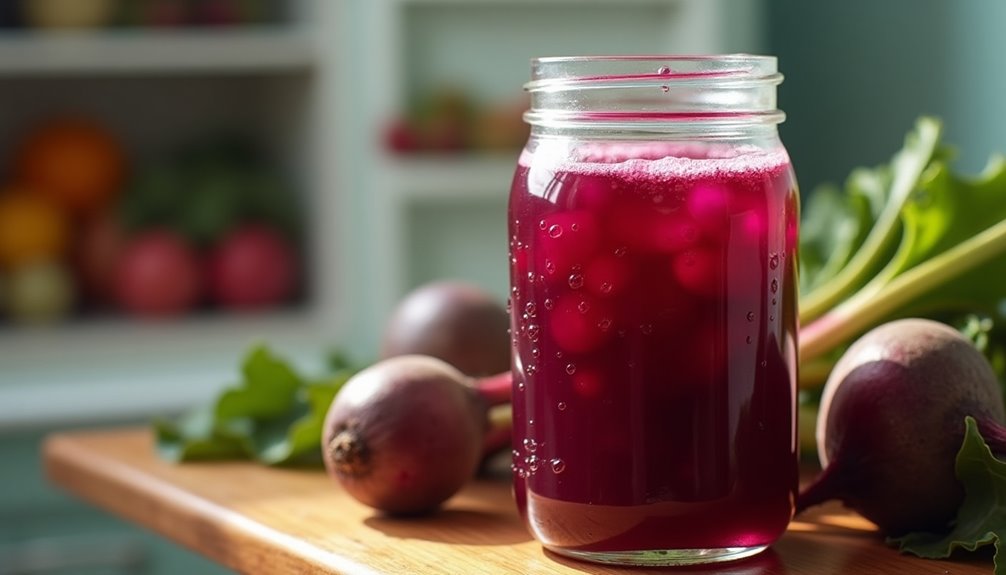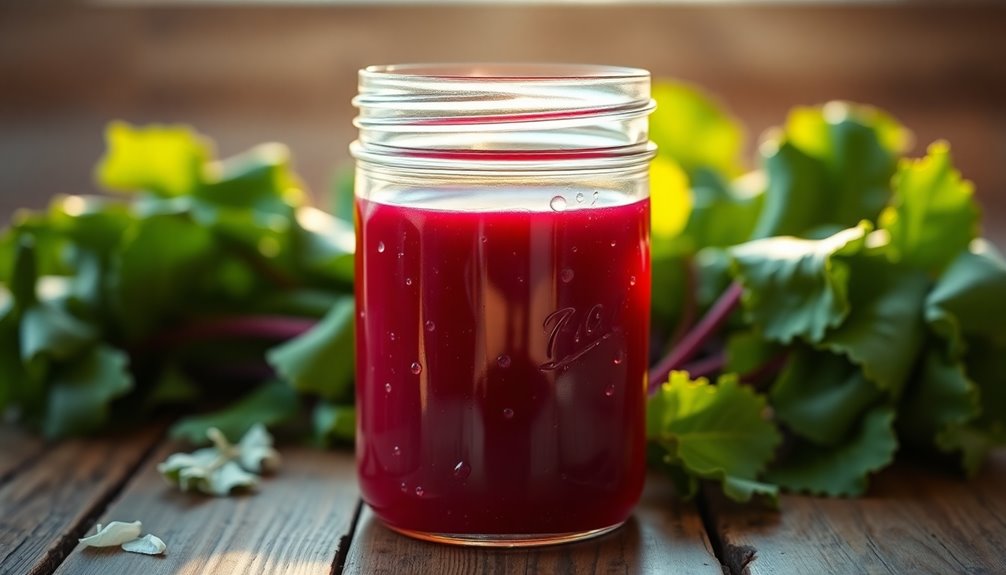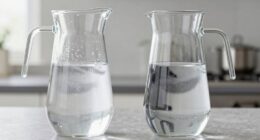Beet juice can last in the fridge for different lengths of time depending on its type. Unopened store-bought beet juice can stay fresh for up to two weeks. Once opened, you should drink it within 2 to 5 days. Homemade beet juice is best enjoyed right away, but it lasts about 24 to 48 hours in an airtight container. Knowing how to store your beet juice properly can help you maximize its freshness and flavor. There's more to discover about this topic!
Key Takeaways
- Unopened store-bought beet juice can last up to two weeks in the refrigerator.
- After opening, store-bought beet juice should be consumed within 2 to 5 days.
- Homemade beet juice is best consumed immediately but can last 24 to 48 hours when stored properly.
- Freezing beet juice extends its shelf life up to six months without significant loss of flavor or nutrients.
- Always check for signs of spoilage, such as sour smell or mold, before consuming beet juice.

Have you ever wondered how long beet juice can stay fresh in your fridge? Whether you're sipping on store-bought beet juice or enjoying a fresh batch from juicing at home, knowing its shelf life can help you make the most of this nutritious drink. Proper storage is key to extending its shelf life, so let's dive into how long you can keep beet juice, and how to spot signs of spoilage.
If you've got store-bought beet juice, you're in luck! Unopened, it can last up to two weeks in the refrigerator when stored properly. Just make sure to keep it in its original packaging, away from light and heat sources.
Once you pop that seal, though, things change a bit. After opening, beet juice stays fresh for about 2 to 5 days in your fridge. So, if you've opened a bottle, it's best to consume it within that timeframe to enjoy its full flavor and nutritional value.
If you're into juicing at home, you've probably made some delicious homemade beet juice. While it's tempting to drink it right away for maximum freshness, you can actually store it in an airtight container in the refrigerator for about 24 to 48 hours.
Just remember, homemade juices are best enjoyed quickly, as they tend to lose their flavor and nutrients over time. When storing, make sure the container is sealed tightly to minimize oxidation and maintain freshness.
Now, if you find yourself with excess beet juice and want to extend its shelf life, freezing beet juice is your best bet. By freezing it, you can keep it for up to six months without losing much of its nutritional value or flavor.
When you're ready to enjoy it again, just thaw it in the refrigerator overnight. This method is perfect if you've made a big batch of homemade beet juice that you can't finish in time.
However, always be vigilant for signs of spoilage. If your beet juice starts to develop a sour smell, changes to a dark color, or you notice any mold, it's time to discard it immediately.
Consuming spoiled beet juice can lead to unpleasant experiences, so trust your senses and err on the side of caution.
Frequently Asked Questions
Does Refrigerated Beet Juice Go Bad?
Yes, refrigerated beet juice can go bad.
You'll want to keep an eye out for signs of spoilage, like a sour smell or taste, a darker color, or any visible mold. If you notice any of these, it's best to toss it.
To maintain its freshness, store beet juice in an airtight container and consume it promptly after opening.
Always trust your senses—if it seems off, don't take the risk!
Do Beets Go Bad in the Fridge?
Beats of beet brilliance can indeed go bad in the fridge! If you've got fresh beets, they usually stay fresh for about one to two weeks when stored properly.
Keep them in a cool, dry place, ideally in a breathable bag. If they start to look shriveled or mushy, it's time to toss 'em.
Always trust your senses; if they smell off or look funky, don't hesitate to discard them!
When Should You Not Drink Beet Juice?
You shouldn't drink beet juice if it smells sour or tastes off, as this signals spoilage.
If you notice a darker color or any signs of mold, it's best to toss it out.
Cloudy strands or a fizzy texture are also clear indicators that the juice has gone bad.
If the juice has been opened for more than five days, it's safer not to consume it.
Always prioritize freshness for your health!
How Long Does Beetroot Juice Keep?
Beetroot juice can keep for varying lengths depending on how you store it.
If you’ve got store-bought beet juice, it lasts about 2 weeks unopened. Once you open it, aim to drink it within 2-5 days. To maximize the freshness and flavor of your beet juice, store it in the refrigerator immediately after opening. Additionally, beet juice not only offers numerous health benefits but also has cosmetic advantages; many are curious about how beetroot juice improves skin tone. Its natural antioxidants and vitamins can help brighten the complexion, giving your skin a healthier and more radiant appearance.
If you make fresh juice at home, consume it right away or store it for 24-48 hours in an airtight container.
For longer storage, freezing the juice can extend its life to about six months.
Conclusion
In conclusion, beet juice can hang out in your fridge for about three to five days—like a vibrant party guest who knows when to leave. To keep that fresh flavor and color, store it in an airtight container. If you notice any off smells or changes in texture, it's time to say goodbye. So, enjoy that nutritious elixir while it's at its peak, and let it fuel your healthy journey!
Cindy thoroughly researches juicing trends, techniques, and recipes to provide readers with practical advice and inspiration. Her writing style is accessible, engaging, and designed to make complex concepts easy to understand. Cindy’s dedication to promoting the advantages of juicing shines through her work, empowering readers to make positive changes in their lives through the simple act of juicing.











